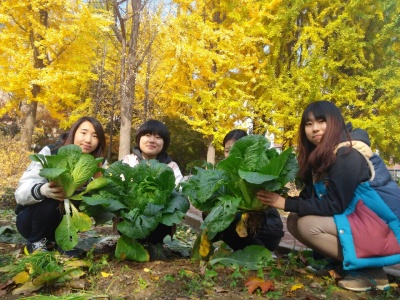
Founded in 2010, Spoongirls is a student-led organization at Ewha consisting of 10 students. The founding members were originally from “Seeding People,” which is a college-united club that started in Korea University. Hoping to spread the joy of farming in Ewha, they began to recruit Ewha students who were interested in farming and cultivated the plot of land behind the Ewha Womans University Library, raising crops such as cabbages and tomatoes.
“Instilling the spirit of Spoongirls in the Ewha campus was my original intention, which made me gather more Ewha students,” said Oh Se-young (Television & Film, 3), the founding member and current president of Spoongirls.
The name “Spoongirls” is derived from the members’ early experience when they dug the ground and cultivated potatoes with spoons since nobody could use the farming tools skillfully. Now, however, the 10 current members participate in Spoongirls’s activities with expertise and enthusiasm. The most fundamental responsibility that Spoongirls values is the presence of organic agriculture on campus.
“If we had wanted to raise huge crops, it would have been much better to take part in a weekend farm instead of Spoongirls,” Oh said. “What we plan to do instead is to generate healthy harvests so that our campus can be more eco-friendly.”
Spoongirls organizes diverse activities with its crops. The members sold their crops during Daedongjae to Ewha students, and this autumn, they made organic products such as green tea pudding with their crops. They even made kimchi, which were distributed afterwards to the elderly who live alone.
The members say that their points of view toward the environment have also changed a lot through farming.
“There was one member who had prejudice about eco-friendly movements, considering them to be dull and boring,” Oh said. “After spending some time at Spoongirls, however, she said that it became a chance for her to rethink about how to protect the environment.”
Even though Spoongirls has now been active for four years and its farming conditions are stabilized, the members struggled at first because it was difficult to maintain their land on Ewha campus. Once, their plot was even destroyed during the winter vacation by the school workers who had thought it was idle land. Furthermore, numerous trial and errors of farming continue to present difficulties for the members.
“Carrying water and composts on a regular basis is difficult for us, since there are no male members to share the labor,” Oh said. “While farming is all about being diligent and steady, it is not so easy to maintain that attitude all throughout the semester.”
Despite the hardships, the members’ passion toward spreading agriculture in Ewha has never diminished. Even though the workload is sometimes demanding for female students to handle, they cherish every moment in raising crops. The joy of harvesting fruitful outcomes at the end of the year makes the activity feel especially worthwhile.
Leading the environment-friendly atmosphere on the Ewha campus, Spoongirls hopes to pioneer the way of teaching Ewha students the importance of taking part in saving the environment.
“Farming is the most effective and practical way that we can actually practice to become eco-friendly,” Oh said. “We hope that more students recognize the delight of preserving the environment starting with our own boundaries.”
Ewha and foreign exchange students who are interested in taking part in Spoongirls’ activities may visit the Spoongirls Facebook page (https://www.facebook.com/spoongirls/) for further information.
Lee Sang-ha
banilab5748@ewhain.net

